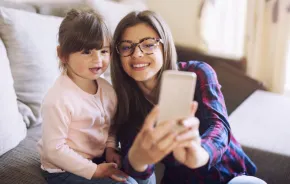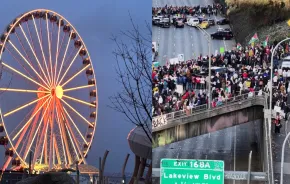
Sean Goode believes fervently in the power of grace to transform lives. This belief has guided his many years working with youths swept up in what he calls the “disease of violence,” which can permanently damage their prospects and possibilities. “I think, as a community, we overvalue the benefits of guilt and we way undervalue the benefits of grace,” explains Goode. “We often think that holding people accountable to what they did wrong is the message to change behavior, but that’s woefully ineffective — it never proves itself to be true.”
Goode is the executive director of Choose 180, an organization that evolved from the King County Prosecuting Attorney’s Office in an effort to reduce the flow of youths into the juvenile justice system. When a first- or second-time juvenile offender commits a low-level misdemeanor, prosecutors have the option to refer them to a Choose 180 workshop instead of filing charges. Choose 180’s “diversion” workshops are designed to help offenders change the direction of their life — literally, by navigating a choice-making tool and process called “The Compass” — supported by and through a community of Choose 180 staff and other connected, caring adults and professionals.
Goode, who was born in Tacoma and raised in South King County, notes that his “training” for this work began when he was 6 years old. He explains that both of his parents suffered from mental health issues, one of his sisters struggled with addiction, and another sister ran away from home as a teenager. He then relates one of his most indelible memories of childhood: visiting his older brother in a juvenile detention facility, where he was serving an eight-year sentence. “[My brother] was incarcerated as a boy at the age of 13 and wasn’t released until he was a 21-year-old man,” recalls Goode.
Goode’s childhood experience of the impact of “justice” on his family life established for him a passionate connection to the sometimes difficult, but ultimately incredibly rewarding, work he does to this day. “The entire pursuit of my life has been creating a platform for young people to be viewed as possibilities to be developed, not problems to be solved.” He has been able to do just that in a variety of ways, from years of employment at the YMCA of Greater Seattle, where he helped support young people in getting jobs and staying connected to school; to leading a gang intervention team in South King County; to working as a chaplain and an early education advocate.
Goode took over stewardship of Choose 180 in 2017, and the organization’s vision of creating an off-ramp from the justice system for young people to return to their community inspires and motivates his work every day. As he says, “I get to wake up every morning and do what I love to do, with purpose. And I can’t imagine a greater gift.”
Choose 180 “envisions a future where youthful behavior is no longer criminal.” How does this statement inform your work?
By nature, adolescents are going to get involved in some pretty consistent things: They’re going to steal. They’re going to fight. They’re going to have emotional issues and aggression and a variety of things that can be problematic if they are not given the appropriate support. But that’s just youthful behavior and they age out of it. All the science shows us that if a young person gets into their mid-20s and they haven’t been criminalized for their behavior, there is a very small to no chance that they’ll engage in future criminal behavior.
But if a [young person’s behavior] has been criminalized in their teens and 20s, then it’s dramatic how exponentially increased the likelihood is that they’ll end up engaging in future criminal activity. So, if we decriminalize youthful behavior and we create safe spaces for young people to develop to their fullest potential, absent intervention by law enforcement or the criminal justice system, then we’re likely to put a humongous dent in our current prison population. And these young people will age out of those behaviors that are simply adolescent.
What are some of the wraparound services offered by Choose 180?
Our organization functions like an emergency room. We strategically engage young people at pivotal moments. This “triage” helps get them well enough, and then we refer them to primary-care specialty practitioners, which are the community of support that often looks like tutors, behavioral health specialists, case managers, connected adults. It depends on the needs of the young person, but it all starts with engaging them at these critical moments. And we do that through our strategic relationships with prosecutors and superintendents.
We have workshops for 12- to 24-year-olds, and they happen on Saturdays. They are four hours long. Young people who would otherwise receive criminal charges get a chance to receive community support in lieu of being found guilty for a crime — they get grace, and we hold them accountable to that grace. The result: Ninety percent of them, 12 months down the line, don’t engage in any additional criminal activity, because they’re being held accountable to who they can be, instead of who they’ve been or what they did.
Who is your personal hero?
This one’s easy: It’s my brother. He never got to live his dream, and I get to be in this space, not only for myself, but also for my brother. It hasn’t been an easy go [for him], but I’m grateful that he’s still a part of my life and that the world gets to benefit from his love.
What do you wish people understood about your work?
To know that all children are children. And that every young person has the capacity to do something really bad and has the equal capacity to do something really good, and that largely hinges upon the community they’re in. If given a community of support, every young person can live into their fullest possibilities. I think we often forget that.
What’s one small action readers can take in their own lives to make positive change happen?
I would say, “Lead with grace,” because the minute we “other” the other, we become the other.
What daily habit or small routine is most important to you?
Every morning, I wake up at four o’clock and I go to work out with a group of people who I have a lot — and nothing — in common with. I’m confronted by things that I don’t want to do first thing in the morning and I have to push past the “can’t do” before I get to do anything else. It is a habit that I rely on, and I’m kind of a jerk when I don’t get the chance to push past the “can’t do.”
What has been the most profound change in your work in the past 10 years?
I would say when prosecutors start looking for ways to not prosecute and schools start looking for ways to not suspend or expel, then you know that you’re having the type of systemic impact necessary in the school-to-prison pipeline.
What advice would you give parents who hope to raise and support their kids to achieve big ambitions?
I would put all of my emphasis on raising kids who know who they are, absent of any activity. And support them in being and not in doing.
If you could have a superpower, what would it be?
I guess I would say teleportation. My wife tells me that I always want to do the most, and that’d be a really cool way to be able to get to places super fast so I can accomplish all the things I like to do.
If you could dine with anyone, living or dead, who would that be and why?
My wife. What’s special about my wife: Before I met her, I thought love was something you needed to earn. And when I was able to share space with her and she was able to love me unapologetically, I truly experienced what love is supposed to look like, and since then, I’ve been able to love the same way. So, my wife.
Favorite read of the past year?
“The Go-Giver: A Little Story About a Powerful Business Idea” [by Bob Burg and John David Mann] — super powerful, super short and really inspiring.
If you could destroy one myth, what would it be?
That guilt is more powerful than grace.
Any ideas for great ways to get kids involved in volunteering?
I think the greatest gift we can give to our kids is to have them participate in what I call co-laboring relationships with other young people their age who may come from different walks of life and backgrounds. I think it’s kind of powerful when kids learn really early how to work with people from communities that aren’t the ones that they’re most familiar with.











